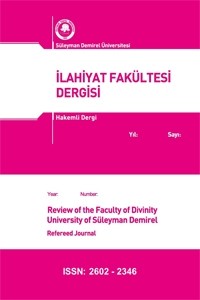
Süleyman Demirel Üniversitesi İlahiyat Fakültesi Dergisi
Yazarlar: ["Galip TÜRCAN", "Fatmanur CERAN KÖKSAL"]
Konular:-
DOI:10.59149/sduifd.1276418
Anahtar Kelimeler:İrade,Cebr,Cehm b. Safvân,Sıfat,Tenzih
Özet: The existing jabr attitudes in Muslim religious culture are associated with the pre-Islamic Arab understanding of fate. Although it is known that there were different approaches to fate among the Arabs of the Jahiliyyah period, the understanding of fate, especially that of jabr, is widely accepted. This is largely related to the sociocultural structure of the society and the Bedouin way of life brought with it the belief in fate. However, the understanding of jabr, which expresses that the divine will determines everything and that human beings are subject to this determined destiny, can also find a religious/theological ground that can be built on the evidence. In fact, while religious texts strengthen the discourse on God, they also define the divine will as absolute in all respects and construct a discourse of jabr at first hand. Thus, while the Qur'an, which contains the basic principles of religion, in a sense concludes these principles with God's absolute will, it is also seen that the Prophet, who communicated these principles to the people, frequently expressed expressions related to the divine will. Even though the scriptures that shape Muslim religious thought bring with them the theological claim that the divine will is absolutely determinative, the fact that jabr, as a religious attitude, occupied an important place in the theological debates was essentially realized by strengthening it on a political ground. The policy of jabr, which the Umayyad rulers developed by basing their political legitimacy and political attitudes directly on the will of God, is the most prominent starting point of the will debates in theology. In other words, the perception of absolute divine will, which was emphasized in the Muslim society, was defended by the highest segment of the society at that time and with a political language, which was the most powerful form of discourse. Thus, the Umayyad policy of jabr played an important role in the factual development of not only the jabrī attitudes but also the fatalistic approaches that emerged in the opposite direction and thus the problem of will in theology, and in the following process, these approaches were redefined and dealt with in the theological dimension. Jahm b. Safwān, who lived during the Umayyad period when jabr was widely expressed, seems to advocate a jabrī stance that is largely similar to the Umayyad claim of jabr in terms of its results. However, his participation in the rebellion movement against the Umayyad rulers and his religious/theological proposals for a solution to jabr show that al-Jahm b. Safwān adopted a different view from the political claim of jabr. Jahm b. Safwān's claim of jabr should be considered as a theological inference that developed in the context of his theological preferences. For this reason, a question about what motivated Jahm b. al-Safwān's adoption of the algebraic position will provide information about the religious/theological ground of the concept of jabr, which has an important place in the approaches developed on the will. As a matter of fact, only when it is evaluated within other theological approaches attributed to al-Jahm b. Safwān, it will reveal its nature along with its theological justification.